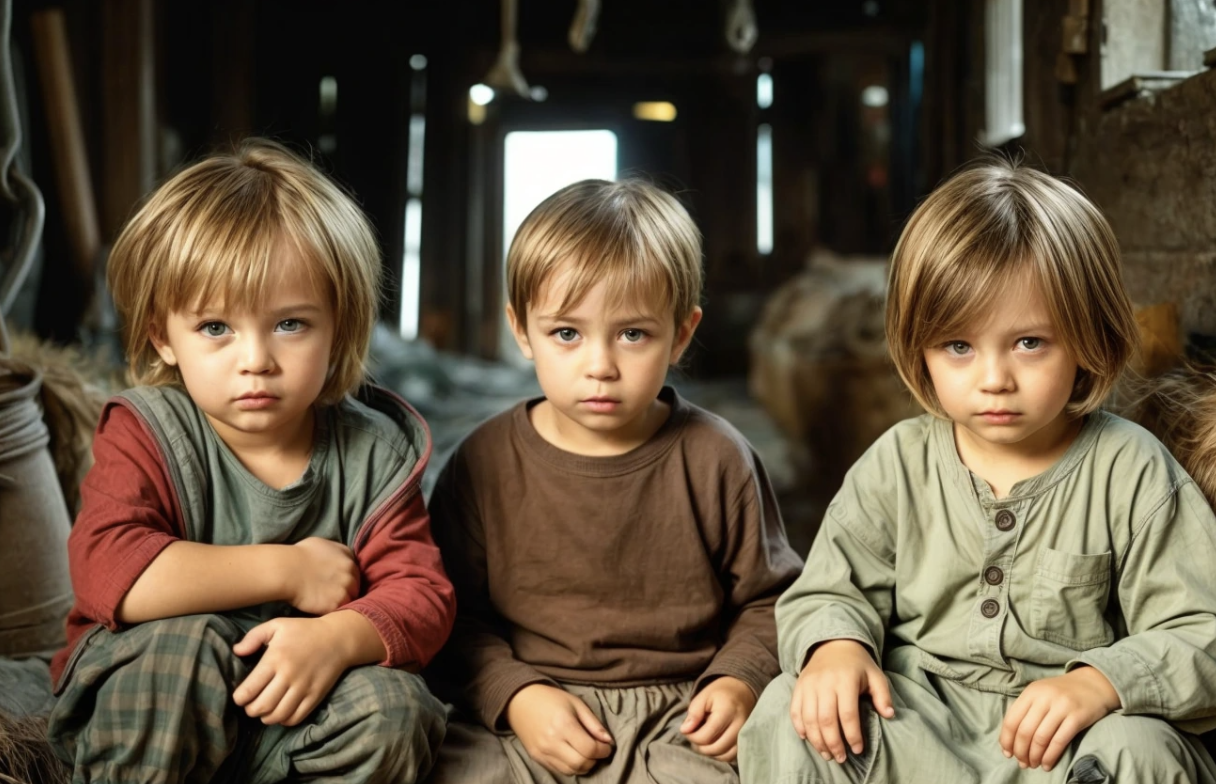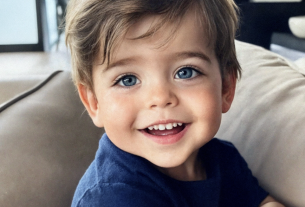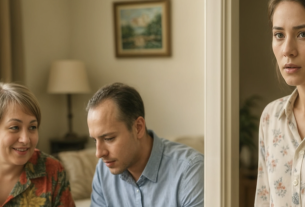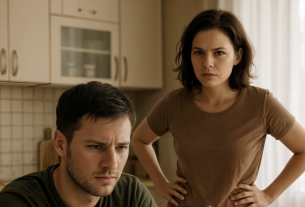The darkness of the December night thickened outside the windows, while inside the old, dilapidated house, a tense anticipation prevailed. Behind the kitchen door, on the floor stained by long-unwashed linoleum, children crowded together — three little ones huddled close like nestlings. Their eyes, full of hope and hunger, were fixed on the crack in the door. They silently watched as modest Olivier salad slowly cooked in the pots, as their mother, Lesya, mechanically stirred the salad with a spoon, as if trying to squeeze more out of it than it could give. The smell of oil and yesterday’s onions hung in the air, but the children didn’t feel appetite — they were tormented by cold, hunger, and waiting. When would their mother say: “To the table!”? When would the celebration begin?
“Hey, what are you doing here all crowded like rats?” — a sharp, rough voice rang out. Uncle Igor, tall and stooped, in a worn sweatshirt smelling of booze, flung open the door and sternly looked over the children. “Get to the room! Can’t you see — the grown-ups are busy!”
He entered the kitchen, leaning heavily on the doorframe, and peered into the pots. His gaze darkened.
“So, what kind of joy will we have?” he grumbled, pointing at the salad with disgust. “Olivier, potatoes, and sour cabbage… This isn’t a celebration, it’s a funeral.”
Lesya, thin, with extinguished eyes and disheveled hair, sighed shortly:
“It’s not just Olivier I made…”
She looked around, making sure the children couldn’t see, and like a smuggler pulled out from the depths of her worn bag a thick, pink sausage stick.
“Here, I bought this… But, of course, it’s not enough for everyone. Besides, it’s bad for the kids — fatty, salty… And I even got some ‘white stuff’ — for the mood, you know?”
Igor smirked; his eyes gleamed.
“Well, you’re something, Lesya! Good job! I got gifts for them,” he said with a theatrical gesture, pulling several tangerines and a pack of candies from his pocket. “Snatched them at the store — no one saw!”
Their laughter was strained, like old rubber. Because behind this scene lay a bitter truth: they were poor. Igor didn’t work — he sat for months on welfare barely handed out by the employment office. Lesya received child benefits, but that money melted like snow in the sun, turning into bottles, snacks, and cheap tobacco. Their life was gray, monotonous, and empty.
They had met recently — two lost people, two emptied hearts. Igor had left his wife, who could not endure his drinking and constant quarrels. And Lesya? She also liked to “relax” — vodka was her refuge from reality, from children’s cries, from loneliness. Like attracts like. But the children — three small souls — were a burden to them. They wanted romance, passion, fun, a celebration for two. But instead — crying, dirty socks, endless “mom, give me,” “mom, I want,” “mom, I’m cold.”
“Maybe… we should send them somewhere? For New Year?” — Igor suddenly suggested, squinting. “At least for a couple of hours…”
Lesya thought.
“Where? To whom? I have no relatives, no friends… No one to watch them.”
Suddenly she slapped her forehead.
“I’ve got it! To the shed! Let them breathe fresh air! At least it’s quiet there…”
Igor nodded approvingly.
A minute later, he was standing in the doorway of the room where the children sat on an old sofa playing with scraps of rope and empty boxes.
“Hey, who wants to be Santa Claus’s guard?” — he said loudly with theatrical intonation. “He’s already on his way! But he will come only to those who guard him outside!”
The children froze.
“Can… can I go with mom?” — quietly asked Vanya, the eldest, a six-year-old boy, holding his younger sister and brother by the hand.
“No!” — Igor snapped sharply. “Only real guards! And if you don’t go — Santa Claus won’t come at all!”
Crying. Whimpering.
“It’s cold… mom, I don’t want to…”
“I said — you’re going!” — he barked, grabbing each by the hand and literally pushing them outside.
Outside — an icy wind, snow, a blizzard. The children, in light sweaters and torn jackets, shivered like aspen leaves. Igor led them to the shed — old, creaky, with a leaky roof and moldy walls.
“Stay here!” — he ordered. “If you behave well — I’ll bring gifts!”
He threw them a pack of cheap cookies — not as a treat but as dog food — and slammed the door. The latch clicked.
Inside it was dark, damp, piercingly cold. The children pressed close to each other, trying to keep warm. At first they believed. Vanya believed, five-year-old Alenka believed, three-year-old Sasha believed. They whispered: “Santa Claus will come… he won’t forget us… he will save us…”
But hours passed. The cold gripped their bodies. Their fingers turned blue.
“Mom!” — shouted Vanya, pounding fists on the door. “Mom, we’re freezing!”
“Mommy!” — the children’s cries echoed.
But in the house… in the house it was warm.
In the kitchen, Lesya and Igor sat at the table, before them a bottle, a plate of sausage, tangerines. They laughed, joked, drank, forgetting everything. The children? Who were they now? Little noise, a distraction in their New Year’s celebration.
“Midnight is soon!” — Igor proclaimed, raising a glass. “To us! To freedom!”
At that moment, there was a knock at the door.
“Who is it?” — Igor frowned.
“I don’t know…” — Lesya whispered, quickly throwing on a robe.
They opened the door — and froze.
Santa Claus stood on the threshold.
The real one. In a red coat, with a beard, a sack over his shoulder.
“We didn’t order you!” — Lesya blurted out.
“And we have nothing to pay with,” — added Igor, looking around as if searching for something to give.
“Everything is paid for,” — Santa Claus answered calmly. “I have come with gifts. Where are your children?”
Lesya instantly brightened.
“Oh! Gifts? We have three! Bring them here!”
“No,” — Santa said strictly. “Gifts are given only to children. In person.”
Lesya was confused.
“Th-they’re… now… in the room…”
She went to the children’s room and peeked. Empty. A thought flashed through her mind.
“Igor!” — she whispered. “Where did you put them?”
“Oops…” — he suddenly went pale. “I… forgot…”
He ran outside, hurried to the shed, opened the door. Empty. Only cookies, soggy with moisture, and traces of children’s tears on the floor.
“They’re gone!” — he whispered, returning, trembling.
Lesya ran out herself. She circled the shed, looked into every crack. No one.
“Where are they?” — she cried.
Igor also ran up, confused.
“I locked them in here… where did they go?!”
Suddenly — the shed door slammed shut with a bang. The latch clicked.
“Hey! Is this a joke?” — Lesya screamed, banging on the door.
“Sit here,” — a familiar voice said — “while I welcome the New Year.”
“Are you crazy?! We’ll freeze!”
“Did you feel sorry for your children, leaving them to die of cold in the shed?” — Santa Claus asked. And at that moment he took off his beard.
Before them stood Stas. Lesya’s ex-husband. The father of their children.
“You…” — Lesya whispered.
“I came to congratulate my children,” — he said quietly, but with icy fury. “But I heard their cries for help. I opened the shed. Took them. Took them to the hospital. They have frostbite. Luckily, in time.”
He left without looking back.
A few hours later, some young guys walking with flashlights heard a knock. They opened the shed. Inside trembled two people — Lesya and Igor, in robes, faces distorted with horror.
The next morning, Lesya ran to the police — to file a report about the missing children.
But there she found a surprise.
The report was already filed — against her.
By Stas.
Through child services, he managed to have Lesya’s parental rights revoked.
“How much longer?” — he said. — “Hunger, cold, indifference…”
And he took the children to himself. To his mother — a woman with a kind heart, warm hands, a home where there was always the smell of pies and laughter.
Later Stas met a woman. A kind, strong person. She loved his children as her own. And a few years later gave birth to two sisters — little, happy, loved.
And Lesya?
Now she had to work. Earn a salary. Buy groceries. Drink less.
Because the child benefits — were no longer hers.
And every New Year she remembers that night.
The cold. The shed. The cries.
And the face of Santa Claus, who turned out to be her past.
And justice.



